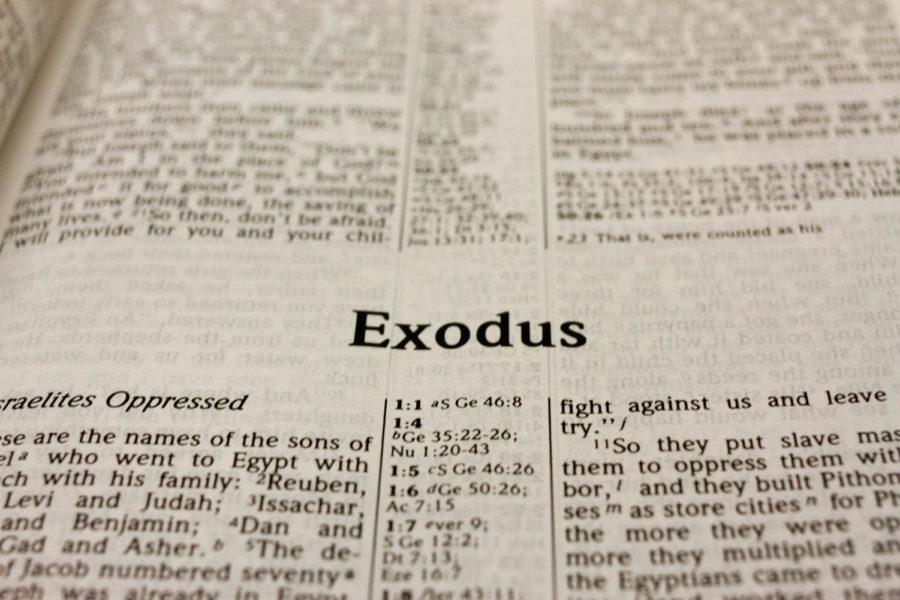Daily: The rise of the ‘nones’: Why our generation is moving away from religion
Photo: Megan Wolff/Iowa State Daily
The gap between the religious and those who do not identify with a religious group is growing, Daily columnist Kristen Daily argued. The reasons depend on the person, but the younger generation seems to be dividing itself from institutions, not just religious organizations.
February 7, 2013
Religion can be a sensitive topic. I, for one, definitely avoid the subject of church when I return to my hometown for breaks. I was raised in a Christian home, like many others, but today would not identify myself as a Christian. If I had to strictly define my beliefs, I would be a pantheist — in the sense that I believe in an all-encompassing god, thus making the universe and divine synonymous.
I believe this because several years ago Christianity stopped answering all of my questions. I questioned why Christianity was “right” and all other religions “wrong”. Truthfully, I realized that I was only a Christian because of circumstance and the family into which I was born. For example, if I would have been born in India, I would probably be a Hindu.
I did not leave the Christian faith embittered or angry, as you might imagine. Naturally, I was somewhat disillusioned with the fact that people’s actions did not match their words It was hard for me to watch the church I attended preach about loving and welcoming the stranger, but in all reality act as a very exclusive organization. Of course, this dissonance can be found in many cases other than faith. Organized religion seemed a pointless exercise; if the goal of all major religions was to love and be a better person to make the world a better place, I didn’t need to attend church to do that.
Ultimately, I have decided that there is a divine presence and being in the world. For me, the simple wonder of creations answers that question. My appreciation of creation and desire to do good and to love are “spiritual” enough for me.
Because of my own movement away from religion, the NPR series “Losing Our Religion” caught my eye. In the series panels of young adults, professors, prominent scholars, and pastors discussed the loss of religious affiliation in the younger generation here in America. The three articles that proved to most helpful to understanding this phenomenon were the following three articles: “Losing Our Religion: The Growth Of The ‘Nones,’” “More Young People Are Moving Away From Religion, But Why?” and “As Social Issues Drive Young From Church, Leaders Try To Keep Them”.
In “Losing Our Religion: The Growth Of The ‘Nones’” Heidi Glenn, a producer for NPR, discussed the rise of the “nones”, the term given to people who claim no religious affiliations by demographers. A study conducted by the Pew Research Center in 2012 revealed that one-fifth of American adults have no religious affiliation (out of 46 million people). This group of “nones” can be described as, “…atheists and agnostics as well as those who ally themselves with ‘nothing in particular’ … includes many who say they are spiritual or religious in some way and pray every day … overwhelmingly says they are not looking to find an organized religion that would be right for them … is socially liberal, with three-quarters favoring same-sex marriage and legal abortion.” Apparently, this generation is the most religiously unaffiliated generation so far in America’s history.
Now the question is this: Why?
Robert Putnam, a Harvard professor who writes about religion, claims that is is not only the church this generation is distancing itself from, but from all institutions in general. He explains that this shift is the result of a generation coming out of the culture wars of 1990s that aligned certain brands of politics with certain religions. Because of this the younger generation tends to move to the left on social issues, while religious leaders in the country move to the right on these issues.
The article “More Young People Are Moving Away From Religion, But Why?” gave evidence to this widening gap between the church and the young generation as it told personal accounts of many young adults who have abandoned their religious upbringings.
In the final article I reviewed, “As Social Issues Drive Young From Church, Leaders Try To Keep Them,” personal accounts from pastors and former church-goers were given, explaining either why they had left the church or why they thought this generation was leaving the church.
For example, Melissa Adelman, a participant in one of the panel discussions, said, “To me a church that would be welcoming would be one where there wasn’t a male-only hierarchy that made all the rules, and there weren’t these rules about who’s excluded and who’s included and what behavior is acceptable and what’s not acceptable.”
And the Rev. Mike Baughman, a United Methodist minister, explained, “If the church was known more for our efforts to welcome the stranger than keep them out, I think the church would have greater credibility with rising generations. … A lot of them have grown up in the church and then rejected it. They’ve read the scriptures that talk about the importance of welcoming the stranger, they’ve read the scriptures about the importance of caring for the poor, and when they see that no longer on the lips of those who are in religious authority, they see that the God we present is bankrupt, and that we’re theologically thin in our ability to even speak our own story.”
This distance and rise of the “nones” is fascinating, and it should be talked about. My question is, if not the church, where do you turn?
——————————————————————————————-
Kristen Daily is a junior in English from Orange City, Iowa.

















